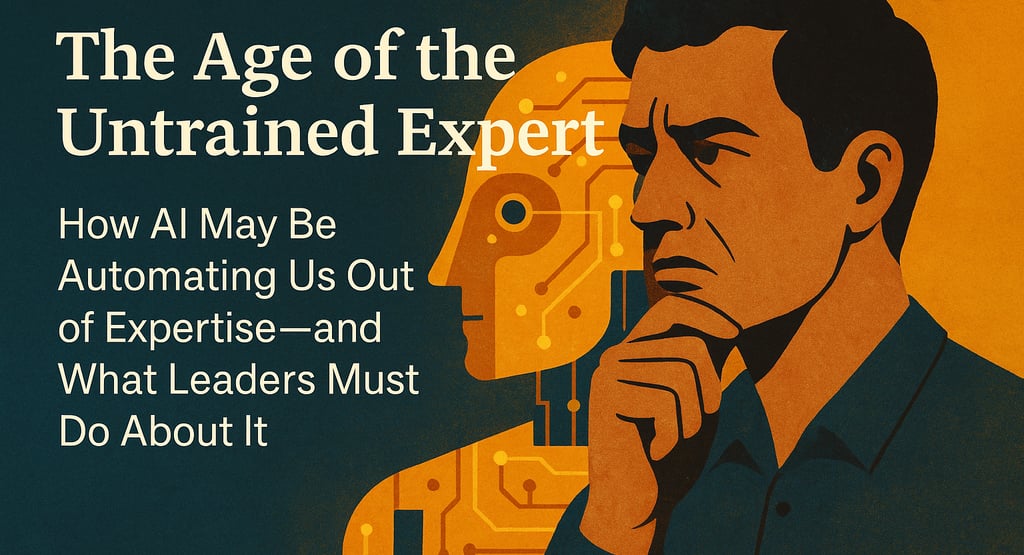The Age of the Untrained Expert
In an AI-first world: ↑ Human interaction is becoming a premium service. ↑ Employees are being trained by algorithms, not mentors. ↑ Organizations face a skills 'identity' crisis.
Matthew Alberts, Ph.d.
5/16/20252 min read


How AI May Be Automating Us Out of Expertise—and What Leaders Must Do About It
Artificial Intelligence is no longer on the horizon—it’s in our workflows, our decisions, our learning, and our hiring. From onboarding to customer service to strategic planning, AI is quickly becoming the engine behind how we work.
But as we chase productivity, we may be sacrificing something much more valuable: human expertise.
🚨 Automation’s Hidden Toll
AI is onboarding employees, managing their workflows, even coaching them through tough scenarios. But in doing so, it’s replacing one of the most important aspects of early career growth: mentorship.
When junior employees are trained by GenAI instead of shadowing experienced colleagues, they miss critical learning moments. They’re exposed to data, not wisdom. They learn outcomes, not nuance. And by the time we realize what’s missing, the mentors may be gone—and the skills, forgotten.
🧠 When Humanity Becomes a Premium Service
In an AI-first world, human interaction is becoming a luxury. B2C services like tax preparation or customer support now charge extra for real human help. This shift is creeping into B2B too, with tiered support models where humans are “premium.”
This trend creates a new digital divide: those who can afford human insight, and those who get the algorithm.
But are we okay with that? When did empathy and expertise become add-ons?
🔍 Skills Are Not Just Tasks—They’re Identity
“Skill erosion” and “skill debt” are more than productivity buzzwords. They signal a deeper issue: the fading of what it means to be skilled at all.
We’re entering a world where people no longer need to learn a task to do it. AI can generate code, write emails, analyze contracts, and manage workflows. But what happens when these systems make mistakes? Will anyone know?
Skills are more than functional—they shape confidence, judgment, and professional identity. Without them, we risk becoming operators of machines we can’t truly understand.
🤖 From Agents to Architects: Rethinking Our Role
AI agents are becoming increasingly autonomous, capable of reasoning, chaining models, and orchestrating decisions. But they follow prompts, not purpose. Without intentional design, we’re building agents that act without wisdom.
Organizations must pivot—from just deploying AI to designing systems where humans remain architects, not just users.
That means:
Embedding human feedback loops into AI processes.
Training employees not only to use AI, but to understand it.
Building governance models that value human oversight as much as algorithmic accuracy.
🎯 The Future of Work Is Designable—Not Inevitable
This is not just a technology shift. It’s a leadership challenge. The companies that thrive in an AI-augmented future will be those that:
✅ Preserve human critical thinking—even when AI can do the task faster.
✅ Balance automation with apprenticeship and mentorship.
✅ Redesign onboarding and learning for a blended human-machine world.
✅ Elevate adaptability and judgment over routine execution.
💬 Final Thought
AI can—and should—amplify what makes us great. But it cannot replace what makes us human.
As we rush to build the future of work, let’s pause to ask: Are we designing systems that create more skilled, empowered humans—or just faster, cheaper outputs?
It’s time to choose. The future of expertise depends on it.
If this article resonated with you or challenged your thinking, let’s connect. I’d love to hear how your organization is navigating the balance between AI adoption and human development.
